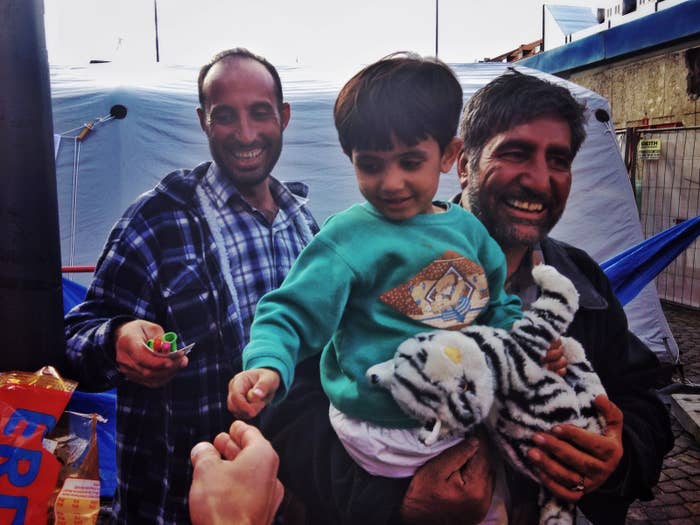
MUNICH — As a burst of crisp, wintry air encircled Munich on Sunday afternoon, a 24-year-old Syrian named Ahmed stood at a police barricade outside the central train station, handing out Kinder Schoko-Bons chocolates to newly arrived refugees.
Ahmed, who asked to be identified by his first name only, had come to Germany only five months ago, having fled his war-ravaged home of Deir ez-Zor, in eastern Syria. The German government had placed him in a town about three hours’ drive from Munich while he waited for his request for asylum to be processed. But a few days ago, as the daily influx of refugees, most of them Syrian, seemed poised to spike into the thousands, Ahmed gathered up some Syrian friends and set out for Munich. Their plan, to the extent they had one, was simply to be there when their fellow countrymen arrived in Germany, and to make a show of support.
“We wanted to see this for ourselves,” Ahmed said. “And we wanted to say hello — in German and in Arabic.”
It may have been an instinctually Syrian thing to do — Syrians are renowned for their hospitality — but on this particular weekend the act could be forgiven for seeming fundamentally German, too.
Over the past several days, hundreds of locals have been turning up at train stations across the country, offering their time, depositing gifts of food and clothes, and cheering on the refugees at a pace nearly matching the arrival of the asylum-seekers themselves.
For some, the effort has served a natural inclination to help those in need, said Colin Turner, one of the leaders of a loosely organized group of volunteers at the Munich train station. For others, it's been an essential antidote to a strain of anti-refugee sentiment that has cropped up in parts of Europe, including some towns in Germany, particularly in the east.
"I think there are many in Munich who are coming because they want to make a point that we are not all like those few hundred idiots in the East," Turner said as he stood near the volunteer welcome tent.
Turner, who took time off from his job as a political organizer for a local politician to devote himself full-time to the refugee cause, said that with so many Munich locals showing up to help, he and other organizers recently had to put out a plea for people to stay home, and to stop bringing things in. (At one point, Turner observed that a volunteer making a casual remark to a reporter about something being in short supply could quickly result in a deluge of that item, so he banned his volunteers from discussing the process with the press.)
It didn't always work. On Sunday, volunteers numbering in the hundreds were being cycled through various jobs on a four-hour rotation — a tactic that was designed as much to serve the overwhelming turnout as it was any actual logistical necessity. Keeping locals involved in the effort, Turner said, proved worth the effort.
"Because we're not officials, we don't have to do things quite so bureaucratically, and we can bring more of a human touch for the refugees," he said. "And I also think, when I see the goodwill of the police and the government toward the refugees, having so many citizens here helps support that goodwill."
Still, by Sunday, the cobbled-together system was starting to show signs of strain. As many as 8,000 asylum seekers had come through Munich in the previous 24 hours, city officials said, and about the same were expected in the days to come. At a press conference in the afternoon, Munich city leaders warned that if the national government didn't urgently step up its role in planning and logistics, the city might quickly run out of space for refugees — perhaps even as soon as Monday.
Simone Hilgers, a spokesman for the government of Bavaria, noted that at some point the loosely structured volunteer network would also have to be enhanced, or perhaps replaced by a more rigorous government one. "It's wonderful what they've done," she said. "But it's obvious that they cannot do it by themselves. The government will have to step in."
In the meantime, a good-natured atmosphere persevered around the train station. At the barricades where Ahmed and his friends stood, a mini-bottleneck formed, as refugees halted in their tracks hearing their native language, and meandered over to borrow a cell phone, or inquire about life in Germany. "It's lovely here," Ahmed told one nervous-looking teenager. "And they have lots of chocolate!"
This was true at least for the time being, as a spirited game of generosity one-upmanship emerged around Ahmed and his crew. While Ahmed handed out peanuts and snacks to refugees, Germans started showing up with cups of hot coffee for Ahmed. Another time, noticing a cherubic German toddler near his feet, Ahmed offered her a bonbon; her father responded by slinging a blue Ikea bag stuffed with Kinder eggs off his shoulder and holding it out for Ahmed.
Later in the day, after he'd been there for several hours, Ahmed dangled his little bag of candies toward a stern-faced Munich fireman and bellowed, in English, “Welcome to Germany!” The fireman stopped, chuckled, and reached for a chocolate.
